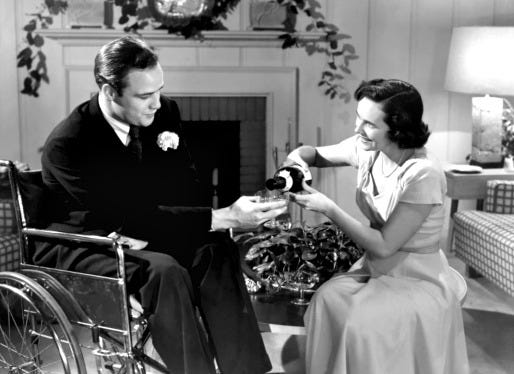The Men (1950)

According to legend, when they first cast a young unknown stage actor in his first film, "The Men," the producers and cast thought they'd made a staggering mistake. During pre-production rehearsals, he mumbled his lines without barely any intonation, and wouldn't even look others in the eye.
His work in front of a camera didn't seem much better at first. In the movie, he's constantly tucking his chin, turning away from the person he's speaking to and darting his eyeballs this way and that. Hardly the standard M.O. for cinematic acting of that era, with its ethos of "Stick out your jaw, and puff up your chest."
Of course, Marlon Brando wasn't your everyday actor playing a standard leading man. Ken "Bud" Wilcheck is an Army lieutenant who was shot in the spine during the war and left a paraplegic. "The Men," written by the great Carl Foreman ("High Noon"), was one of the first mainstream movies to address soldiers dealing with paralysis.
At a crisp 86 minutes, the film is a fairly straightforward drama that makes all the obvious choices, but nonetheless manages to wander into daring territory. Start with the fact that it was shot at the Birmingham Army Hospital in Van Nuys, where both Foreman and Brando spent time living with the soldier-patients prior to shooting. Eventually, dozens of them would appear in the film.
It's pretty obvious watching the movie, directed by Fred Zinnemann in one of his earliest feature film efforts, to discern who the professional actors are and who are the real soldiers. The best of the amateurs is Arthur Jurado as Angel, a body-building paraplegic with dreams (cut short, naturally) of buying a house.
His name was Angel because if you were a Latino character in a Hollywood movie between 1940 and 1970, it was contractually required that your name be Angel.
Jack Webb is solid as Norm, the acerbic intellectual of the bunch, and Richard Erdman has fun as Leo, the wisecracking flimflam man. But it's no surprise that Brando steals the show, showing the mix of volatility and seductive power that would become his hallmarks. He even manages to spend a great deal of the film topless or wearing one of those tight-cropped T-shirts he would make so famous two years later in "A Streetcar Named Desire."
It's funny; Brando's career was often marked by its physicality, split into two phases: lithe and corpulent. He never really seemed to have an in-between, though I guess the days of "The Godfather" and "Last Tango in Paris" hit that mark the closest.
I won't bother with a treatise on Method versus other schools of acting; frankly, I just don't care how a performer finds their center or sense memory or all that jazz. I judge an actor by what's up on the screen, and I think anyone watching "The Men" in 1950 knew a major new talent was on hand, even though the film flopped financially.
The dialogue isn't the greatest; Foreman was still developing as a writer. After Angel dies — because all characters named Angel in Golden Age movies die — Bud stews to his fiancée, Ellen (Teresa Wright): "If he was normal, he'd have had a chance. You try and you try, but you're still behind the eight-ball."
That ain't exactly the Bard, but Brando still makes it sing.
Perhaps as a prisoner of its age, the story is forced to revolve around a romance. Bud at first refuses to see Ellen following his injury, but is convinced by the stern-but-caring doctor (Everett Sloane) to come around. They eventually reconcile and marry, but then the movie takes an unfortunate step where the open-hearted young woman who was more than ready to embrace life with a man in a wheelchair suddenly has second thoughts, literally on her wedding night.
It's a false moment, and sets off one narrative stumble after another during the last 20 minutes or so.
The real heart of "The Men" is given location by its title: the camaraderie, strained and often backbiting, between this hospital ward full of brave men all suffering from the same physical and psychological wounds. If only Foreman, Zinnemann and producer Stanley Kramer had stuck to their instincts and given the boot to the dew-eyed girl, we might've really had something.
Instead, "The Men" is justly remembered as what it is: a cinematic stepping stone.
3.5 Yaps



